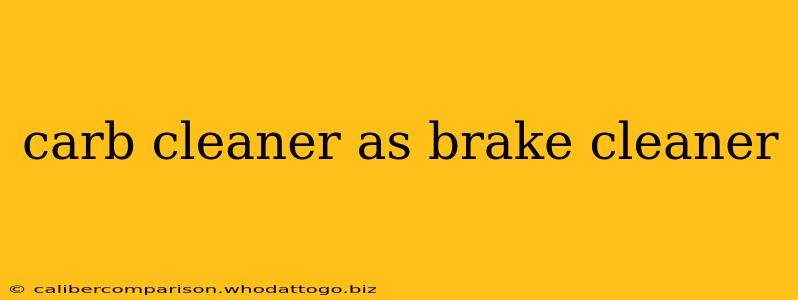Choosing the right cleaner for your automotive needs can be tricky. Many mechanics and DIY enthusiasts often wonder if they can substitute carb cleaner for brake cleaner, or vice versa. While both are powerful solvents designed to remove grease and grime, using the wrong product can have serious consequences. This detailed comparison explores the similarities and differences between carb cleaner and brake cleaner, highlighting when each is appropriate and the potential risks of substitution.
Understanding Carb Cleaner
Carb cleaner, short for carburetor cleaner, is a potent solvent primarily used to clean carburetors and other fuel system components. Its formulation is designed to dissolve fuel residues, varnish, and other deposits that can impede engine performance. Key characteristics of carb cleaner include:
- High Volatility: Carb cleaner evaporates quickly, leaving minimal residue. This is crucial for fuel system components where any leftover cleaner could contaminate fuel.
- Strong Solvency: It effectively dissolves a wide range of deposits, including stubborn varnish and gum.
- Often Contains Chlorinated Solvents: Many carb cleaners contain chlorinated solvents, making them highly effective but potentially harmful to the environment and human health if mishandled. Always refer to the product's Safety Data Sheet (SDS) for proper handling instructions.
Understanding Brake Cleaner
Brake cleaner is specifically formulated for cleaning brake components, such as calipers, rotors, and drums. It's designed to remove brake dust, grease, and other contaminants that can interfere with braking performance. Key features of brake cleaner include:
- Rapid Drying: Like carb cleaner, it dries quickly to prevent contamination.
- Effective on Oils and Greases: It excels at dissolving various oils and greases common in braking systems.
- Often Non-Chlorinated: Many modern brake cleaners are formulated without chlorinated solvents, making them environmentally friendlier. However, this can sometimes mean they are less effective at dissolving certain stubborn deposits than carb cleaners.
Can You Use Carb Cleaner as Brake Cleaner?
While both cleaners share similarities, using carb cleaner as a substitute for brake cleaner is generally discouraged. Here's why:
- Potential Damage to Rubber Components: Carb cleaner's aggressive solvents can potentially damage rubber seals and components within the braking system, leading to brake failure.
- Residue Concerns: Even though carb cleaner evaporates quickly, residual chemicals could interfere with the friction properties of brake pads or rotors.
- Environmental Impact: Chlorinated carb cleaners can be more harmful to the environment than many brake cleaner formulations.
Can You Use Brake Cleaner as Carb Cleaner?
Using brake cleaner as a carb cleaner is also not recommended, although the consequences are potentially less severe.
- Less Effective Cleaning: Brake cleaner may not be as effective as carb cleaner in dissolving varnish and stubborn fuel residues found in carburetors. This incomplete cleaning could lead to performance issues.
- Potential for Incomplete Cleaning: Leaving behind residues can cause problems with the delicate fuel metering system.
Conclusion: Stick to the Right Tool for the Job
While carb cleaner and brake cleaner share some similarities in their ability to remove grime and grease, their specific formulations make them unsuitable for cross-application. Using the wrong cleaner can lead to compromised performance, costly repairs, and even safety hazards. Always use the cleaner specifically designed for the intended application – carb cleaner for fuel systems and brake cleaner for braking components. This practice ensures optimal cleaning and safety. Remember to always consult the product's Safety Data Sheet (SDS) before use and follow all safety precautions.

